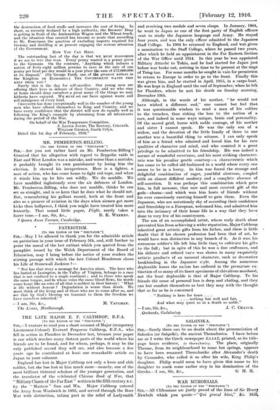THE LATE MAJOR E. F. CALTHROP, R.F.A.
(TO THE EDITOR OF THE SPECTATOR...1
Sra,—I venture to send you a short account of Major (temporary Lieutenant-Colonel) Everard Ferguson Calthrop, R.F.A., who fell in action in Flanders in December last, because your paper is one which reaches many distant parts of the world where his friends are to be found, and for whom, perhaps, it may be the only published record they will see, and also because a few years ago ho contributed at least one remarkable article on Japan to your columns.
England has lost in Major Calthrop not only a keen and able soldier, but she has lost in him much more—namely, one of the most brilliant Oriental scholars of the younger generation, and the translator of the celebrated Chinese Book of War, that "Military Classic of the Far East" written in the fifth century s.c.
by the " Masters " Sun and Wu. Major Calthrop entered the Army from Woolwich in 1895, and served through the Boer War with distinction, taking part in the relief of Ladysmith and receiving two medals and seven clasps. In January, 1904, ho went to Japan as one of the first party of English officers sent to study the Japanese language and Army. He stayed four years, and was the only officer admitted to the Japanese
Staff College. In 1908 he returned to England, and wars given a nomination to the Staff College, where he passed two years, after which he held an appointment in the Far Eastern Section of the War Office until 1914. In this year he 'was appointed Military Attache to Tokio, and he had started- for Japan just before war broke out, arriving in time to be present at the siege of Tsing-tao. For some months he sought in vain far permirzion to return to Europe in order to go to the front. Finally this was given him, and he started in April, 1915, in a cargo-boat. He was kept in England until- the end of September, when he left for Flanders, where he met his death on Sunday morning, December 19th.
Although, in the words of his mother, " he would not have wished a different end," one cannot but feel that it was questionable wisdom to send a man of his calibre to the trenches, thus risking the loss to the nation of a rare, and indeed in some ways unique, brain and personality. Of the sacred grief, borne with noble courage, of his mother and sister I cannot speak. He was the only son of a widow, and the devotion of the little family of three to one another was a beautiful -thing to witness. I can only speak of him as a friend who admired and loved him for his rare qualities of character and mind, and who counted it a great privilege to be admitted to his friendship. His was indeed a nature of wonderful sweetness, and his most striking character- istic was his peculiar gentle courtesy—a characteristic which has come to be called old-fashioned in a world where every one seems to be in 'a hurry. In him was found the strange and delightful combination of eager, youthful alertness, coupled with an almost diffident modesty and a complete absence of self-assertion. It was perhaps this combination which gave him, in full measure, that rare and most coveted gift of the gods—charm—and which won him hosts of friends without his ever consciously exerting himself to gain them. Even the Japanese, who are notoriously shy of according their confidence and friendship to a European, welcomed him, and admitted him into the intimacy of their home life in a way that they have done to very few of his countrymen. -• - The son of an accomplished artist, whose early death alone prevented him from achieving a wider reputation, Major Calt lir%) inherited great artistic gifts from his father, and there is little doubt that if his chosen profession had been that of art, he would have won distinction in any branch of it. As it was hit strenuous soldier's life left him little time to cultivate his gifts to the full ; but in spite of this he was a line craftsman, and his delicate and refined taste was shown in many exquisitely artistic products of an unusual character, such as decorative bookbinding in the Japanese style. Among the numerous deplorable losses the nation has suffered in the premature ex- tinction of so many of its finest specimens of chivalrous manhood, not the least deplorable is that of Major Calthrop. To his friends the sense of personal loss is deep and abiding, and they can but comfort themselves as best they may with the thought that as far as he is concerned
- " Nothing is here for tears . . .
. . . nothing but well and fair, And what may quiet us in a death so noble."


































 Previous page
Previous page